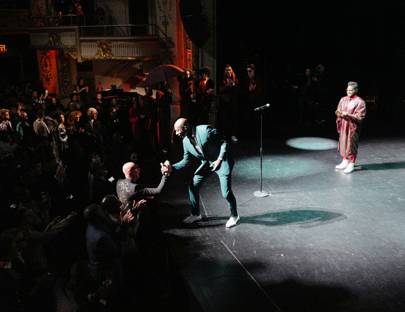Boateng’s latest collection showcased the evolution of his work in recent years: a paean to what he terms “Africanism”, rich with Ghanaian cloth cut with Savile Row techniques, and traditional African prints positioned alongside heritage British tweeds. Womenswear – a new development for Boateng, first introduced last year as a result of his 19-year-old daughter’s pleading prompts – played a starring role: slinky silken dresses and fluid jumpsuits alongside, of course, the twists on traditional tailoring he has built his name designing. But besides showcasing his dandyish vision of inclusive and contemporary sartorialism, last night presented an opportunity for Boateng to invite the wealth of black creatives who have long rallied around his brand to celebrate the cultural shift he referenced. “What I like about what’s going on with him at the moment is that he’s having a renaissance in himself, and he’s diversifying,” noted Idris Elba, who wore one of Boateng’s suits to marry Sabrina Dhowre in Morocco last week and, last night, was dressed in a narrowly tailored suit made of a monochromatic kente. “He’s being influenced by what he sees out there and is taking a cultural stance about coming from Africa – and there’s a real cultural pride that has started to leak into his work.”

Staging his show at the Harlem Apollo is, of course, testament to the fact: the historic venue is credited as kickstarting the careers of black musicians from Ella Fitzgerald and Billie Holiday to Jimi Hendrix and Lauryn Hill, and last night was filled to the rafters with everyone from Jamie Foxx and Michael K. Williams to the local community and students. “Ozwald is a black man from the streets just like I am – and I understand his walk; I walked it, too,” said Eric B, one half of one of the world’s most influential hip-hop duos, and who first played the Apollo in 1986. “You see that X right there?” he said, gesturing towards a cross in the centre of the stage, where Boateng took his bow later in the evening. “Standing on that, seeing this theatre all lit up and the way people look at you… it’s something you can’t explain. Seeing another black man in that position has a great impact – and the way he cuts suits is the same way we do music: it’s poetry in motion.”
Boateng’s decision to show in New York was made to correlate with the centenary of the Harlem Renaissance: the creative and intellectual movement that ensured the black experience was finally acknowledged within American culture. Last night, the turnout of supporters from music to sports; acting to fashion, felt like a tribute not only to the likes of Langston Hughes and Josephine Baker, but a new era of cultural inclusion, too. Seeing one of Savile Row’s most celebrated designers interweave that particular heritage with his Ghanaian roots, and showcase his collections within such historic African-American surrounds to an audience filled with some of the world’s most recognisable black celebrities, was a remarkable amalgamation of cultures. “A lot of people wait until someone dies to say how much we appreciate them,” reflected Eric B. “But it’s time for us to give each other flowers while we’re still alive.” When Ozwald took his bow on that cross in the centre of the stage, clenching his fists with pride, you got the sense he felt the weight of his success.

No comments:
Post a Comment